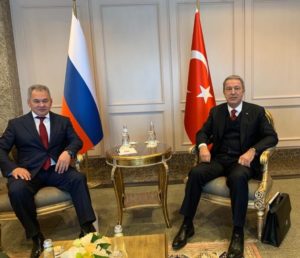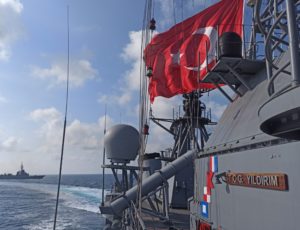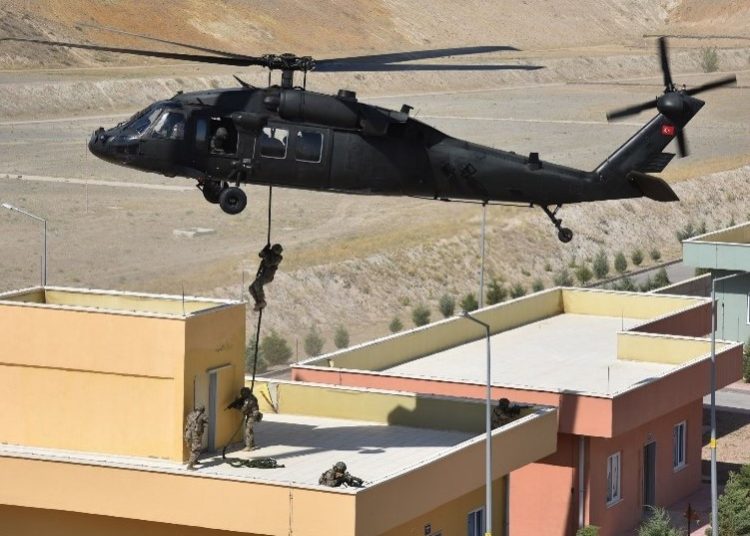Abdullah Bozkurt/Stockholm
The Turkish army’s elite Special Forces Command (Özel Kuvvetler Komutanlığı, or ÖKK) — designed to engage in unconventional warfare, secret cross-border operations, sabotage and surveillance – assigned special advisors to the Ukrainian army and started training Ukrainian troops under a multi-year plan, according to a classified memo obtained by Nordic Monitor.
The memo, submitted to then-Chief of General Staff Hulusi Akar, now the defense minister, in June 2016 made a detailed assessment of Turkey’s engagement in training the Ukrainian military. The memo was prepared to comply with Akar’s orders of May 27, 2016 in which he asked for conclusions after a military team returned from a coordination and assessment visit to Ukraine.
The Turkish military sent a special team to Ukraine composed of representatives of various forces to make an assessment on how to coordinate joint military training. The visit took place April 6-10, 2016.
According to the memo ÖKK’s engagement with Ukrainian troops covered the training of Ukrainian special forces by the ÖKK teams, starting with a program in Turkey. Kyiv asked Turkey to send two officers at the rank of colonel or major for language training in Ukraine, a request that was approved by the Turkish General Staff in 2016.
Secret memo submitted to then-Chief of General Staff Hulusi Akar, now the defense minister, reveals how Turkish special forces trained Ukrainian military personnel in unconventional warfare:
Turkey also gave the green light for hosting and training about a dozen Ukrainian special force members in weeks-long sharp-shooting and sniper courses as well as free fall parachuting and other special force capabilities until 2018.
The memo also covered the assignment of special military advisors from the Turkish army to train and advise the Ukrainian military. Joint military exercises between the special forces of both countries were planned for 2018.
The 2016 plan was later expanded to include more troops and involved the land, air and naval forces as well.
Last week Nordic Monitor reported that Ukrainian Naval Forces Command personnel were given “Navy Internship” training on a Turkish corvette.

Turkey and Ukraine have recently signed several agreements to increase cooperation in the economic and military fields. The latest Framework Agreement on Military Cooperation, signed by Turkish Defense Minister Akar and his then-counterpart, Andrii Taaran, in October 2020, allows Ukrainian military personnel to receive training in Turkey or vice versa.
With the agreement, the armed forces personnel and military students of the two countries will be able to exchange visits for military education and training. Among the areas of cooperation is the exchange of intelligence. The military intelligence clause of the agreement covers the exchange of military intelligence about countries that are considered to be harmful to the mutual interests of Turkey and Ukraine.
Russia is apparently bothered by the military cooperation between Turkey and Ukraine. In April 2021 Russia warned Turkey against Ankara’s efforts to boost cooperation with Kyiv. In an interview with the Argumenty i Fakty newspaper, Russian Foreign Minister Sergey Lavrov said, “We strongly recommend that our Turkish colleagues carefully analyze the situation and stop fueling Kyiv’s militaristic sentiment,” which could be interpreted as a threat. “We hope Ankara will adjust its line based on our legitimate concerns,” he added.

In response Turkey accused Russia of arming anti-Turkish groups. Answering questions from lawmakers in the parliamentary Planning and Budget Committee on November 4, 2021, Foreign Minister Mevlüt Çavuşoğlu said Turkey encounters Russian-made arms in its fight against hostile groups in various places and defended the sale of drones to Ukraine.
“We say that after a country buys it [a drone], it can use it however it wants. It can also be bought from another country. We also come across Russian weapons in various places. I destroy them, I destroy or seize them when I come across them,” he said.
Çavuşoğlu was referring to Russian arms found in the hands of anti-Turkey groups ranging from the Kurdistan Workers’ Party (PKK) to the Libyan National Army (LNA) and Armenian militia in Nagorno-Karabakh.












